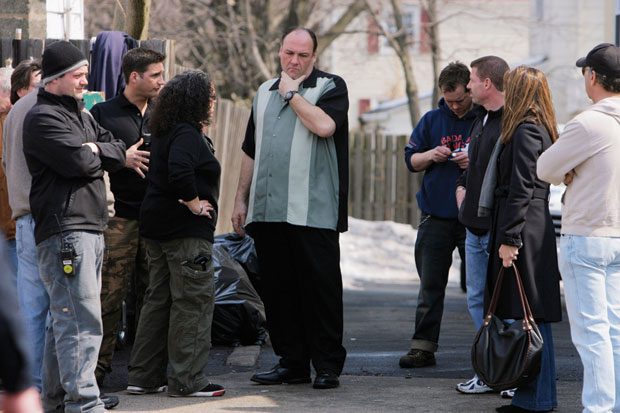
When an actual family fights about money, they’re usually really fighting about love. But when a theater family fights about money, it’s about money—and love, too, just not for each other, but for the audience.
In 2003 the cast of The Sopranos started a fight about money that threatened, for a time, to end the show. When it was over, it turned out all along to have been about the audience for The Sopranos, which happened to be the most multiplatform- accessible hit TV show in history. They were a different kind of audience for a different kind of show, and they suggested new possibilities for entertainment that aspired to art.
It started when four of the show regulars banded together—an idea inspired by four regular players on The West Wing, who had recently done the same thing with great success—to demand more money per episode. Jamie-Lynn Sigler (Tony’s daughter Meadow), Robert Iler (his son A.J.), Drea de Matteo (Christopher’s girlfriend Adriana), and Tony Sirico (Paulie Walnuts) were all getting $20,000 to $30,000 per episode, and they wanted an increase to $100,000. That would add up to $1.3 million for each per year—maybe not Kelsey Grammar money, but more than the dog got on Frazier.
The West Wing quartet had more than doubled their per episode salaries to over $70,000 after missing a couple of early read-throughs, so the demands weren’t beyond reason. Even more troubling to HBO executives, however, were press reports that they weren’t facing just the Four Horsemen in supporting roles. Lead actor James Gandolfini was waiting to hear how their negotiations went before
he decided to set an asking price of his own for the next season.
HBO said publicly that Gandolfini was being “greedy,” that he was more interested in his own ability to earn big money than in the rest of the crew. At one point HBO shut down production for a week, throwing all the grips and caterers and cameramen out of work with no pay, blaming the show’s star for it in the press. Gandolfini filed suit to dissolve his own two-year $10 million contract. HBO felt
it had no choice but nip this sort of thing in the bud, and it responded with a $100 million lawsuit of its own against Gandolfini, charging him with trying to break a legitimate contract and destroy what together they’d made into a very lucrative property.
Jim tried several personal overtures to calm the waters, one at the Screen Actors Guild awards ceremony in March, walking over to the gathered HBO execs and telling them how much he “appreciated” what the company had done for him, and again at a private meeting later in that week. The response every time was pretty stony. Producer Brad Grey—who had noted that contract negotiations at The Sopranos had started sounding like a Mafia shakedown—did a last-minute negotiation that found a compromise.
Gandolfini’s salary was more than doubled again, to over $800,000 per episode; all told, he stood to earn more than $13 million for the fifth season, more than the $11 million HBO had first offered, but less than the $16 million he’d initially demanded. The rest of the cast and crew went back to work immediately, with back pay for the week they’d missed. That meant a lot to Gandolfini at the closing.
And the four regular players who’d started the whole thing? Their salaries more than doubled too, to around $75,000 per episode.
But the story doesn’t end there. After the brinkmanship of the 2003 salary negotiations, things were quiet on the money question for two years. But only a very few people knew that some of that quiet had been bought by Jim personally.
“He was a really good guy,” actor Steve Schirripa, who played Uncle Junior’s right hand, Bobby “Bacala” Baccalieri, told New York’s WFAN radio station after Gandolfini died. “A really good guy. As good of an actor as he was, he was a better guy. A generous guy. The guy gave us $33,000 each—sixteen people. There’s a lot of people who made a lot more money than him. In season four he called every one of the cast members and gave us a check. He said, ‘Thanks for sticking by me.’ It’s like buying 16 people a car.”
The other way of looking at it is $528,000 out of Gandolfini’s $13 million for the fifth season went to his fellow Sopranos cast members. While it’s probably true that other actors have done extremely generous things with the money they’ve received, stories like this one have few if any contemporary precedents. Certainly not at that amount. And it goes a long way toward explaining the loyalty—extending to their own sort of omerta about James’s personal life and his behavior on the set—that his cast mates and friends consistently express for James.
It definitely set a tone on the set—the play was the thing, not the ego of the individual actors. Gandolfini’s friend Susan Aston told him in those years that he’d be able to work as an actor as long as he wanted to, for the rest of his life, after The Sopranos. But he knew some of his fellow actors weren’t so lucky. And it was the ensemble that made it work, that gave them all the best career opportunity they’d ever likely have.
In four years, Gandolfini had leaped from working class to the 1 percent, but he had not forgotten where he’d come from, or all the people he was constantly thanking for his own success. “All the fuss during The Sopranos really was pretty ridiculous,” he said much later. “None of us expected it to last, and it lasted almost 10 years.”
Read Part One here. Read Part Two here. Read Part Three here.
Editor’s Note: This is the fourth of a four-part series excerpted from James Gandolfini by Dan Bischoff. Copyright 2014 by the author and reprinted by permission of St. Martin’s Press, LLC.
Dan Bischoff covers the arts for the Star-Ledger. He lives in South Orange.



